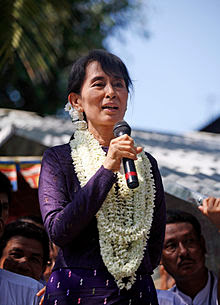Burma: Suu Kyi Willing To Be President
By RFA
Burmese opposition leader Aung San Suu Kyi declared Monday that she is willing to lead the country as president and that her party will work to amend the constitution that blocks her from leading the government.
Speaking at a press conference held by her National League for Democracy (NLD) party, she said it is her duty to serve as president of Burma, which is scheduled to hold the next general elections in 2015 in which the NLD could put up a good showing.

“Since I am leading a political party, I will have to have the courage to be a president. If the people want it, I will have to do so,” she said.
Burma’s constitution, written in 2008 under the country’s former military junta, bars her from the presidency on the grounds that her sons possess foreign citizenship and her late husband was a foreigner.
But Aung San Suu Kyi said her party is committed to making changes in the constitution that would allow her to take the executive office.
She signaled that such a move would not be easy, as the military remains a formidable force in parliament and is still lukewarm to democratic change despite President Thein Sein’s bold political and economic reforms.
“In order to amend the constitution in this regard, it has to be changed in parliament,” she said in an apparent reference to possible hurdles in the legislature.
She said changes to the constitution, which rights groups say is undemocratic, remains a priority for the NLD, which boycotted the last general vote in 2010 but joined parliament after landslide victories in by-elections in April this year.
“Since we entered the by-election, this has been one of our policies, to amend the constitution, and we will be pursuing doing so,” she said
Military representatives
Her comments followed remarks last week by Thein Sein, who said he would accept her as president if she were elected, but that he alone could not amend the constitutional clauses that prevent her from running.
The country’s constitution reserves a quarter of seats in parliament for unelected members of the military—giving them enough seats to effectively bar constitutional change, which requires a three-quarters majority.
Former or serving military generals also dominate the nominating process for presidential candidates, who in Burma must be appointed by the consent of parliament.
Aung San Suu Kyi said at the press conference that members of the military are still hesitant in supporting the country’s reforms as it transitions toward democracy.
“We cannot say yet that the military is participating in democratic reform, at this point,” she said.
She warned that if the military did not cooperate in implementing the reform agenda, it could dampen the country’s progress.
“If the military is doing what a military should be doing, we can say this is a bit closer to democracy. If the military is doing work they are not supposed to be doing, this will discredit them and will not yield good results for the country.”
“Military representatives are also our citizens, and I think they would understand that they will benefit also if the country is in good shape,” she said.
Ethnic tensions
Her comments came after her return to Rangoon last week from a 17-day tour of the U.S., where she was hailed as a democracy icon.
But during her trip, she faced criticism from international rights groups for not speaking out more forcefully about ethnic minority Rohingya following bloody violence between the group and the Rakhine community in western Burma in June.
“When I was on my trip, I was criticized for not condemning the other side. As one who wants to be a negotiator, I will not blame one side or the other,” she said, adding that she wants to work toward the benefit of both groups involved in the conflict.
“I can’t be used by one side only, but rather I want to be used for the benefit of both sides,” she said.
Asked about ongoing fighting between government troops and ethnic rebels in northern Burma’s Kachin state, she said that while the responsibility for carrying out peace talks remains with the government, not her opposition party, she would welcome any role in mediation efforts.
“As for now, we are not in the position to get involved in the peace process officially.”
“But if the ethnic groups want me, I am ready to participate,” she said.
Thein Sein
The press conference came as Thein Sein arrived in Seoul on Monday for a three-day state visit involving talks with South Korean President Lee Myung Bak over economic cooperation.
Thein Sein, who belongs to the ruling military-backed Union Solidarity and Development Party, has left open the possibility of serving another term in office after the 2015 elections.
“If I have my way, I will only serve one term,” said the 67-year-old retired general, who assumed office for a five-year term in March 2011, at a forum in New York last month.
“But of course, the future of the position depends on the needs of the country and the wishes of the people,” he said.
Reported by Nyein Nyein Pyate and Khin Khin Ei for RFA’s Burmese service. Translated by Khin May Zaw. Written in English by Rachel Vandenbrink.
